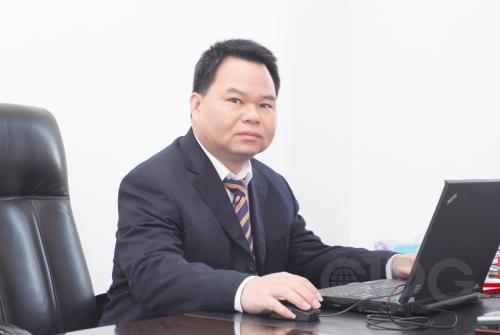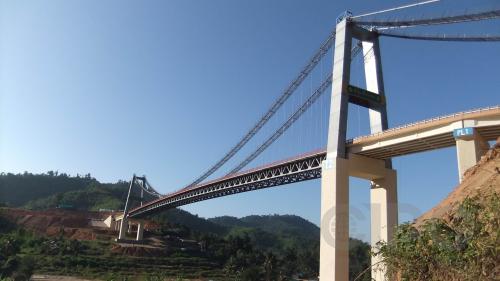| 
Zheng Jin, President of Liugong and Board Chairman of OVM

A bridge constructed by Liugong in Myanmar
Headquartered in Liuzhou, south China's Guangxi Zhuang Autonomous Region, Liugong Machinery Group Co. Ltd. is China's leading construction machinery producer and also China's first listed company in the construction machinery sector. At the end of 2010, Liugong acquired OVM Machinery Co. Ltd., a leading prestressing producer in the country. After the purchase, OVM's profits grew rapidly against a headwind.
Recently, ChinAfrica conducted an exclusive interview with Zheng Jin, President of Liugong and Board Chairman of OVM, on the group's global expansion, new opportunities brought about by China's Belt and Road Initiative and the influence of the country's Internet Plus strategy. Edited excerpts of the interview follow:
ChinAfrica: China's construction machinery sector has entered a slower, more deliberate period of adjustment compared with its previous rapid expansion. Working under conditions of sluggish market demand and severe overcapacity, how can Liugong realize stable development as one of the leading businesses in the sector?
Zheng Jin: To further sharpen our competitiveness, we have adopted the following measures. Business integration has been accelerated - Liugong has adopted main engine production as its core business, while key component production and producer services serve as our two major auxiliary businesses.
We have increased input in product upgrade and technological innovation despite a worsening business environment. Technology and a valuable brand are solid foundations for Liugong's stable growth.
Liugong has also seized opportunities in China's ongoing reform of state-owned enterprises (SOEs) to optimize its assets and develop new business. We will expand into new areas, such as agricultural machinery, modern agricultural services and the financial industry. Documents for the listing of OVM have been submitted to the China Securities Regulatory Commission, and OVM is expected to get listed in 2016.
Investment and operation risks have been prevented by restructuring or shutting down Liugong's continuously poor-performing subsidiaries. Internal management has been strengthened to increase the profitability of our subsidiaries.
Meanwhile, our global expansion has been pushed forward. More business opportunities will emerge along the China-proposed Silk Road Economic Belt and 21st Century Maritime Silk Road (the Belt and Road Initiative), and Liugong would like to tap that enormous potential.
From 2012 to 2014, OVM experienced a business revenue increase of over 10 percent and a net profit growth of over 40 percent. How can OVM grow so quickly when so many of its peers are struggling? What is the secret to its success?
In recent years, OVM has grown quickly despite disadvantageous market conditions. The secret lies in the following aspects.
First and foremost, OVM boasts a wide range of quality products and professional services. It is also competent in technological innovation and therefore leads China's prestressing industry.
OVM boasts an advanced and highly efficient sales network. Its seven regional companies and 30 marketing and sales centers are scattered across the country to offer convenience to clients.
After 20 years of overseas business expansion, its global marketing and sales network covers over 60 countries and regions, with overseas offices in countries like Viet Nam, Indonesia, Saudi Arabia and Iran. Overseas market shares have been continuously on the rise over the past few years.
Finally, we have an advanced marketing concept. Simply relying on powerful products can hardly solve customers' problems or differentiate yourself from your rivals. Under these circumstances, OVM has created a new marketing concept - providing one-step solutions to customers by helping them detect and solve problems rather than merely offering products and services.
There has been a trend among industrial leaders to seek business opportunities in overseas markets. Could you please introduce the current condition and future plans of Liugong's global expansion? How much percentage of global sales makes up total sales, and what is your long-term target?
Liugong started tapping the global market as early as 2003. In recent years, as Liugong increases its overseas investment by building production bases and marketing and sales centers in foreign countries, our company has scored remarkable achievements in its global journey.
To date, Liugong has established five major regional bases, eight marketing and sales subsidiaries, one industrial design research center, three manufacturing centers and eight parts centers in overseas markets. Liugong has over 260 dealers scattered in nearly 130 countries and regions, and it has a global marketing, sales and service network comprised of more than 2,600 sales and service centers, both offering strong support to Liugong's global expansion.
After its more-than-a-decade-long foray into the global market, overseas sales have accounted for more than 30 percent of Liugong's total sales, and the percentage is expected to near 40 percent by 2020, when Liugong will basically finish its global business layout.
To achieve that goal, Liugong will pay more attention to customers' demands, make more efforts to tap developed markets while sustaining growth in developing markets and further improve the value of the Liugong brand.
When implementing its ongoing global strategy, with the exception of marketing and sales, Liugong has built an industrial chain in some key countries and regions. These industries include research and development, manufacturing, marketing and sales, and financing, therefore contributing to and supporting the local economy.
In July 2009, Liugong's Indian production base was put into use, becoming the first factory that Chinese companies have set up in the country. The factory turned into profits from losses in 2014 and has since entered the fast lane of development. In 2015, Liugong established a factory in Brazil, realizing economies of scale and cost competitiveness.
Since China proposed the Belt and Road Initiative, an increasing number of construction machinery companies have accelerated their business expansion along the Belt and Road regions. What advantages does Liugong have to offer support to the connectivity and infrastructure constructions in these areas?
First of all, we have an advanced vision in this regard. As a pioneer in globalization, Liugong has made business layout in all the 60-plus countries along the Belt and Road regions, except Italy and Spain. In the five Central Asian countries, Russia, Mongolia, Germany, Poland, Latvia and Pakistan, Liugong has established a sound distribution network and strong support ability for services and parts. In 2012, Liugong purchased Huta Stalowa Wola's civil construction machinery unit in Poland and its distribution subsidiary, Dressta Co., in an attempt to build a more powerful distributor and dealer network.
We have built a strong sales and service network with wide coverage. Liugong has always paid great attention to network construction in countries along the Belt and Road regions. Whenever Liugong's equipment is used in infrastructure construction projects, clients can enjoy timely and effective post-sale services.
We have also built a mutually beneficial relationship with our dealers. With much emphasis on risk control, Liugong has adopted many measures to support the development of its dealers and built strategic cooperative relations with its dealers around the world. That's why Liugong is able to maintain a stable dealer network in a sluggish market with fierce competition.
Finally, we have been continuously increasing input in research and development for better-quality products. Liugong's products are not only targeted at the Chinese market, but also at the global market. Liugong is one of the few Chinese companies that have continuously been able to expand its market share in North America and Western Europe in leaps and bounds.
Many countries along the Belt and Road regions have harsh weather conditions; they therefore have a high demand for construction projects that can withstand these climates. Liugong products have gone through trials and tests over past years, so they are able to cope with any conceivable or complicated construction conditions in those countries.
During its global foray, has Liugong met with any difficulties? What experiences can Liugong offer to other Chinese companies that are expanding overseas or plan to do so?
The process of Liugong's globalization took place in three steps. First, it has established regional headquarters around the globe. Second, it has globalized its manufacturing by investing overseas, including building factories in overseas markets. The final step will be overseas mergers and acquisitions, which could prove more complicated than the previous two steps. In the future, Liugong will strengthen its presence in key markets.
Going global is so much more than simply selling Chinese products overseas. Rather, it should be a strategic move, and the company in question should attain recognition and respect in local markets so that its products can dominate the market. When going global, Liugong has encountered many difficulties.
The first obstacle is language. When Liugong started its globalization bid in 2003, only five of our employees could speak English. Therefore, employees are constantly encouraged to improve their language skills. For instance, Liugong's staff in India are required to read local newspapers every day to learn English and at the same time learn about local politics and the economy.
The second obstacle is the difference between domestic and foreign markets. For instance, for the same horsepower products, the price in Poland is three times the price in China, making our sales staff less capable of selling products, and it's also quite difficult for Polish employees to sell Liugong products because of a lack of communication and understanding between two vastly different cultures.
Another example was our experience in the United States. Several years ago, Liugong sold 10 excavators to the country. Later, a problem with the seat was reported to Liugong. After sending out engineers to test the machine, no problems were detected whatsoever. Finally, the engineers realized the problem was caused by differences in average height between Chinese and U.S. drivers. U.S. drivers tend to be much taller than their Chinese counterparts, and Liugong's seat design specifically caters to Chinese drivers, therefore presenting us with a problem.
On August 11, Liugong opened its flagship store on Hc360.com, a leading business-to-business e-commerce website, selling all its products and parts online. As China pushes forward its Internet Plus strategy as a new growth engine, how does Liugong plan to use the strategy to boost its growth?
The flagship store on Hc360.com is only the beginning for Liugong in embracing the Internet. Since the strategy is pretty complicated, Liugong is adopting an experimental approach.
The basic concept would be to combine this strategy with our more traditional services to better cater to the clients and the market, better integrate resources, and improve internal management of the company.
The Internet Plus strategy can lead to better interaction between the company and clients. There used to be a lack of communication between clients and producers in the traditional manufacturing industry. Now, social media can help improve the relationship between clients and producers so that customers can engage in the decision-making process for Liugong products and services. This will become a new growth engine for Liugong.
Second, technologies - such as cloud computing, the Internet of Things, 3D printing and big data - can be used to better integrate resources to realize more automatic, digital and intelligent production. For instance, a platform can be constructed to connect clients, tech-savvy people and Liugong employees to generate innovative ideas for our company.
The strategy could be used to reshape Liugong's internal management. Internet-based thinking will help create a more efficient and horizontal organization. The traditional value chain of the company will be changed to make sure that people are the determining element of innovation. Meanwhile, as a state-owned enterprise, Liugong pays special attention to controlling operation and management risks. Measures based on big data, the Internet of Service and e-commerce will be utilized to help Liugong enhance its ability to manage risk.
|